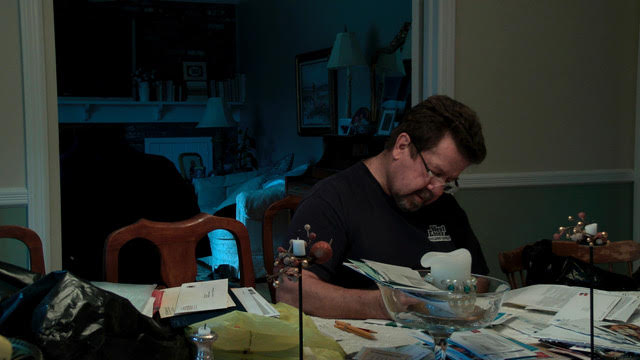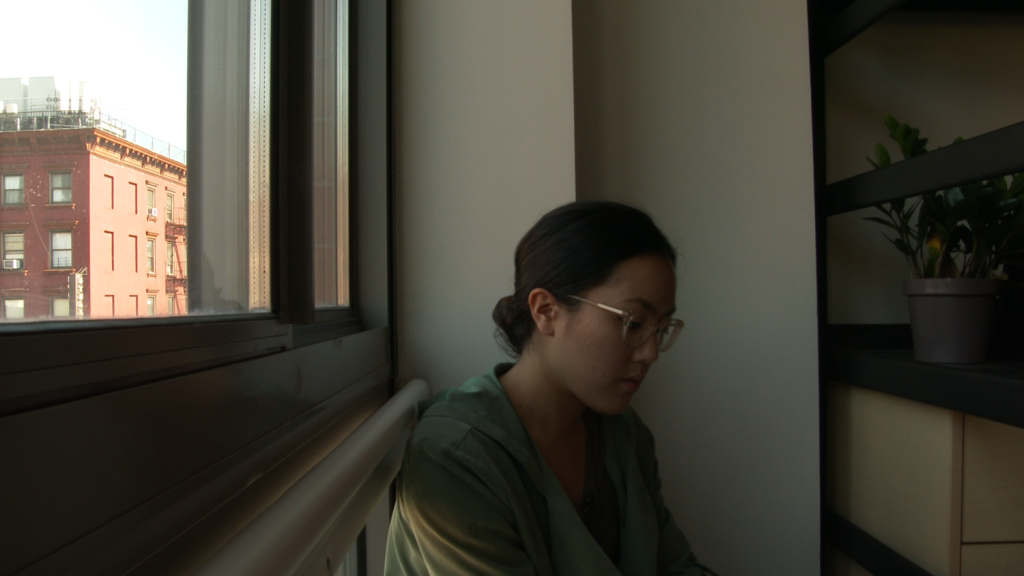“Metamorphosis” by Nina Hölzl
Logline: Metamorphosis is an episodic journey into the past and present of one of the fastest changing areas in Manhattan – the Meatpacking District. Through the eyes of six long-term witnesses we discover the dark and dirty secrets of this now so-polished neighborhood.
Nina Hölzl is a creative seeker who travels the world to find truth, beauty and inspiration. By means of documentary film she hopes to depict the changes we need to see today, and to encourage empathy and understanding amongst all earthlings.
“In the Wake: A Record of Direct Action” by Samuel B. Veal
Logline: In early November, after the 2016 U.S. presidential election, the direct action group Rise and Resist forms in order to act against threats to equality, justice, and human rights. As members of the group put themselves on the line in the form of civil disobedience, they also discover a new common identity in the changing and seemingly divisive Trump era.
Samuel B. Veal, growing up in rural Sandersville, Georgia, found that storytelling had the power to establish common ground among different people. After a career in the major motion picture industry, Veal sought a move into the world of nonfiction cinema as a way to reconnect with that former understanding. His goal is not to be a filter, but rather a vessel for marginalized populations through storytelling.
“Out of Sight” by Channa Goodwin
Logline: We can see them from our glass towers, but we don’t often think about what our towers mean to them. Migratory birds face a major problem in our cities. What is this problem, and can it be solved?
Channa Goodwin grew up in a household of strong women in the Pacific Northwest. Her interest in film bloomed in high school, but she explored other areas during her undergraduate career. A directing job reminded her of her love of filmmaking, and a drive to do work of greater magnitude landed her at The New School.
“Music Lessons” by Lesley Grand
Logline: In Jamaica, Queens, this verite film chronicles the rare coming together of fifteen spirited 11 and 12-year-olds with a gifted new teacher to take up the often punishing task of playing the violin. Along the way the ensemble proves wrong the conventional wisdom that to succeed you must begin learning to play by the age of 6.
Lesley Grand, a 67-year-old retired television news reporter, had always dreamed of making long form work — much longer than the standard 1 minute 30 second tv news piece that defined her career in broadcast journalism. Inspired by her 7 grandchildren, she joined the Doc Studies certificate program at The New School where she found her own ensemble of teachers and classmates who helped make her dream come true.
“Extra Credit” by Matthew Slutsky
Logline: In their final year of high school, Robert and Destiny enroll in an improv theatre class. The stakes are high. Not only must they eventually perform for a public audience, but this year is their last chance to get back on track to graduate after nearly failing out of high school. This extra class will give them extra credit; it will also give them the chance to create new characters for themselves, onstage and off.
Matthew Slutsky hails from Philadelphia, and has spent the past fifteen years working in politics, issue advocacy and technology. After years of dabbling, he has followed his passion and leapt into filmmaking. When he is not lugging a camera and tripod around New York City in search of subjects, he can be found at home in Brooklyn with his wife Patty, young son Henry and a sheepdog named Clara.
“Nine Letters” by Cristina Müller
Logline: The sensation of living in New York, away from home, is shared by those who come to live in this great metropolis from elsewhere. In Nine Letters, this experience of ‘here and there’ is conveyed by letters, and by images of everyday urban life, evoking the dream state of the present imbued by the past.
Cristina Müller is a Brazilian-Swiss filmmaker who works as a director and editor, mostly in documentaries and music videos. Her latest projects include Orchestra Soul, a documentary shortfor Futura TV Channel (Brazil, 2015), The Snow, a short film made at the Kinomada film laboratory in Saguenay, Quebec (Canada, 2016), and pre-editing for the feature documentary Favela Olímpica directed by Swiss filmmaker Samuel Chalard (Switzerland, 2017).

“Raul” by Kristin Sztyk
Logline: Raul achieved the American Dream while still in his twenties. But then, years later, it unexpectedly fell from his grasp. As his daughter points the camera in his direction, she asks him to reflect on the pursuit of dreams, and seeks his advice about her own.
Kristin Sztyk’s curiosity is insatiable. Over the years it has inspired her to study history, travel extensively, and explore numerous academic and creative interests that finally led her to documentary filmmaking. Armed with questions and a desire to connect with people, filmmaking is her permanent fix for the curious.
“Sidewalking” by María Gabriela Torres
Logline: The sidewalk is a public space where people connect to the world and to each other through the eyes of anonymity. Through the camera eye, the filmmaker explores this basic component, common to any city of the world, and discovers that it is much more than the material that supports our bodies as we put one foot in front of the other.
María Gabriela Torres is an outspoken, creative journalist who found her passion for moving images through photography. While living and working in Colombia as a producer for an international news channel, she decided to switch from the TV industry to documentary filmmaking in her search for a way to tell stories that extend well beyond the usual journalistic questions of what, when, where and how.
“De Colores” by Luz Marina Zamora
Logline: Aura has cleaned the houses of other people for 30 years. But soon she will become the owner of many houses of her own. The film accompanies Aura during the last stage of her journey – a portrait of a woman who came here as a sweet lamb and became a tiger.
Luz Marina Zamora received a BA in Mass Communication from the Universidad Catolica Andres Bello with a specialization in audiovisual in her home country Venezuela. Having risen to the position of assistant director, Luz has experience in feature films, documentaries, short films and commercials. With a strong technical background, Luz was also the youngest and only female Technical Director in television in her country. When she was six years old, she was given a Minolta SRT 101. Since then, cameras have fascinated her. One of her short documentaries, Caracas Fenced (2010) won an Honorable Mention in the Caracas Filmminuto Film Festival. Luz moved to New York in 2015, after being awarded a merit-based scholarship and admitted to The New School. She embarked on an MS in Media Management to get a broader perspective of the film industry and also joined the Documentary Studies one-year certificate program. In 2016 she was awarded the Davis Peace and Diplomacy Grant and a Fellowship in the Women’s International Leadership Program at International House in New York.
“Devil of Music” by Keriann FitzPatrick
Logline: This character study follows Yulia Niko, an underground female Russian deep house composer and performer, who takes to the stage in Brooklyn and Miami. Yulia’s experience reflects what it is to be a foreigner in contemporary America in pursuit of the American Dream – with the ultimate goal of becoming a world renowned DJ.
Keriann FitzPatrick from Sag Harbor, New York, completed her undergraduate work at The University of Tampa, studying Communications and Film Media Arts. With a background in narrative filmmaking, she has now expanded her knowledge of cinema to include documentary as well as audio production. “The difference between an amateur and a professional is attention to detail”, her first film production professor once told her. Since then she has taken pride in creating a unique style that distinguishes a Keriann film by its meticulous attention to detail and the highest production quality possible.
“Maryam Arrived on Wednesday” by Mahdokht Mahmoudabadi
Logline: Maryam arrives in the U.S. from Iran for the first time. Her sister drives to JFK to meet her. Although tired and jetlagged, Maryam proceeds directly to her first destination in America, a public school in Brooklyn, where she picks up her niece at the end of the school day. Maryam’s journey is both real and metaphorical: the story of diaspora and immigration is the story of a chain of stories of arrivals and meetings.
Mahdokht Mahmoudabadi was born and raised in Iran. She has worked with international media and as a video editor. Since moving to the U.S. four years ago, she has worked in farming and sustainable development, in addition to capturing and documenting her journey as an immigrant in this land.

“Windows” by JoMarie Almendra
Logline: Filmmaker JoMarie Almendra moved to New York to make a documentary. At a time of political unrest in Trump’s America, she reflects on what she, her mother, an immigrant from the Philippines, and an asylum-seeker in a New Jersey detention center have in common.
JoMarie Almendra is a filmmaker from Tracy, California. In addition to filmmaking, she has focused on several other areas in media and the arts, including animation, music, and graphic design. However, her singlemost defining aspect since childhood is her hunger for travel: not in a touristic sense, but as a means of understanding global crises and political climates. Through filmmaking, she aims to document these issues while offering her films as a platform for the unheard and unseen around the world.

“Home Made” by Diana Khong
Logline: Home Made is an intimate, contemplative portrait of two queer tattoo artists navigating an industry traditionally dominated by white, straight, cisgender males. Through their trials and triumphs, the film weaves together the parallel narratives of Jasmine, a shop owner in Philadelphia, and sally, a stick-and-poke artist in Brooklyn.
Diana Khong received her MBA from Toronto’s York University. However, uninspired by corporate culture, she has worked exclusively for arts and film organizations. Since arriving in New York, Diana has taken up filmmaking and gotten a few more tattoos along the way—trending ever further from a business trajectory. (Sorry, mom.)

“Diva Dogs” by Fran Champagne
Logline: The world of dog fashion in New York City has its own particular glamour, warmth and red carpet prestige. At the heart of this community, which originated as a response to animals in need, is Ada Nieves, co-chair of the New York City Pet Fashion show, the largest in the nation, and Anthony Rubio, an haute couture pet designer who travels the world with his shows.
Fran Champagne, born in Montreal, Canada, is a vegetarian who loves animals and travel. She makes torn paper collages, stop motion animation and documentary films. She has lived in many places throughout North America and overseas. Recently she moved from Santa Fe to Brooklyn, where she resides with her husband, two daughters, two puppies and two birds.
